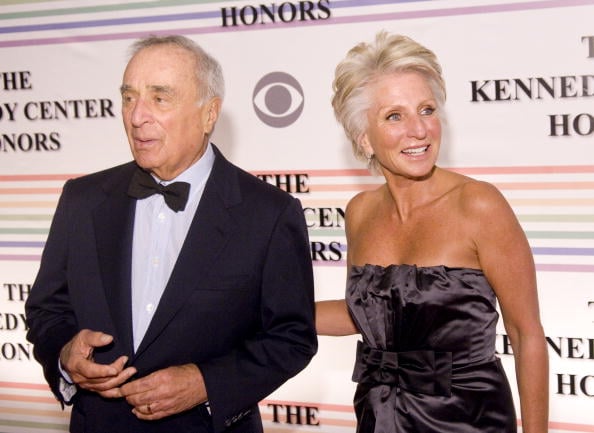What was Sidney Harman's net worth?
Sidney Harman was an American entrepreneur, engineer, public servant, and philanthropist who had a net worth of $500 million. Sidney Harman was best known as the founder of Harman International Industries, the pioneering audio electronics company behind such brands as JBL, Harman Kardon, and Infinity. Over a career that spanned more than six decades, Harman built a multibillion-dollar business empire in high-fidelity sound systems while also leaving his mark on government, media, and education. Late in life, he became known for his surprising acquisition of Newsweek at age 91, making him one of the oldest figures ever to make a major media deal.
Often described as a Renaissance man, Harman combined business acumen with a deep belief in public service, innovation, and the arts. His fortune, at the time of his death in 2011, was estimated to be in the hundreds of millions. His widow, Jane Harman, inherited a portion of his estate, which included his Newsweek stake and other assets.
Early Life and Education
Sidney Harman was born on August 4, 1918, in Montreal, Canada, and raised in New York City. His father was a tradesman, and his mother worked in retail. Harman showed early academic promise and graduated from Baruch College (then City College of New York) in 1939 with a degree in business.
He began his career working as an engineer for various electronics companies and gained valuable experience in manufacturing and product development during the 1940s and 1950s. His early years in the audio industry laid the groundwork for what would become a transformative contribution to consumer electronics.
Founding Harman Kardon
In 1953, Harman co-founded Harman Kardon with his business partner Bernard Kardon. The company introduced the world's first integrated hi-fi receiver, revolutionizing how consumers experienced music at home. Harman Kardon quickly became synonymous with high-quality sound, and the company grew rapidly, introducing a string of innovations that earned it a place at the forefront of the audio equipment industry.
Sidney eventually bought out Kardon's share of the company and expanded Harman International into a global powerhouse. Over the decades, Harman International acquired or launched multiple brands, including JBL, Infinity, Mark Levinson, and AKG. Its products became mainstays in homes, concert halls, and cars around the world.
Under Harman's leadership, the company developed deep relationships with automakers, becoming a dominant supplier of in-vehicle sound systems for brands like BMW, Mercedes-Benz, and Toyota. By the 2000s, Harman International had become a publicly traded company with billions in annual revenue.
Government and Academia
Harman took a hiatus from business in the late 1970s to serve in the Carter administration as Under Secretary of Commerce from 1977 to 1978. In that role, he focused on industrial innovation and technology policy. Though his tenure in government was brief, it reflected his belief that business leaders had a responsibility to contribute to the public good.
After leaving government, he resumed his role at Harman International and continued to grow the company through strategic acquisitions and innovation. He also became increasingly active in philanthropy and academia. He founded the Harman Center for the Arts in Washington, D.C., and served as chairman of the board of trustees at The Aspen Institute. He also held positions at institutions such as Harvard, USC, and the California State University system.

Getty Images
The Newsweek Gamble
In 2010, at the age of 91, Harman made headlines by purchasing Newsweek magazine from The Washington Post Company for $1 plus the assumption of its liabilities, which included tens of millions in debt and pension obligations. The once-iconic publication had been losing money and readership, and many in the media industry were stunned by the acquisition.
Harman acknowledged the financial risk but said he saw an opportunity to revitalize serious journalism. He soon merged Newsweek with the digital media company The Daily Beast in a deal orchestrated with Barry Diller's IAC. Though Harman took a hands-off approach to editorial content, he remained deeply interested in the magazine's future until his death less than a year later.
Death and Legacy
Sidney Harman died on April 12, 2011, at the age of 92 after being diagnosed with acute myeloid leukemia. At the time of his death, his net worth was estimated to be around $500 million, much of it tied to his ownership in Harman International and other investments.
In 2017, several years after his death, Harman International was acquired by Samsung Electronics in an all-cash deal worth $8 billion. Though Sidney did not live to see the transaction, the sale underscored the immense value of the company he had spent his life building.
His legacy lives on through the Sidney Harman Academy for Polymathic Study at USC, the Harman Center for the Arts, and numerous philanthropic initiatives that he supported. In addition to his business and public service achievements, he is remembered for his wide-ranging intellect, deep curiosity, and enduring belief in the intersection of commerce, culture, and civic duty.










 Bengali (BD) ·
Bengali (BD) ·  English (US) ·
English (US) ·